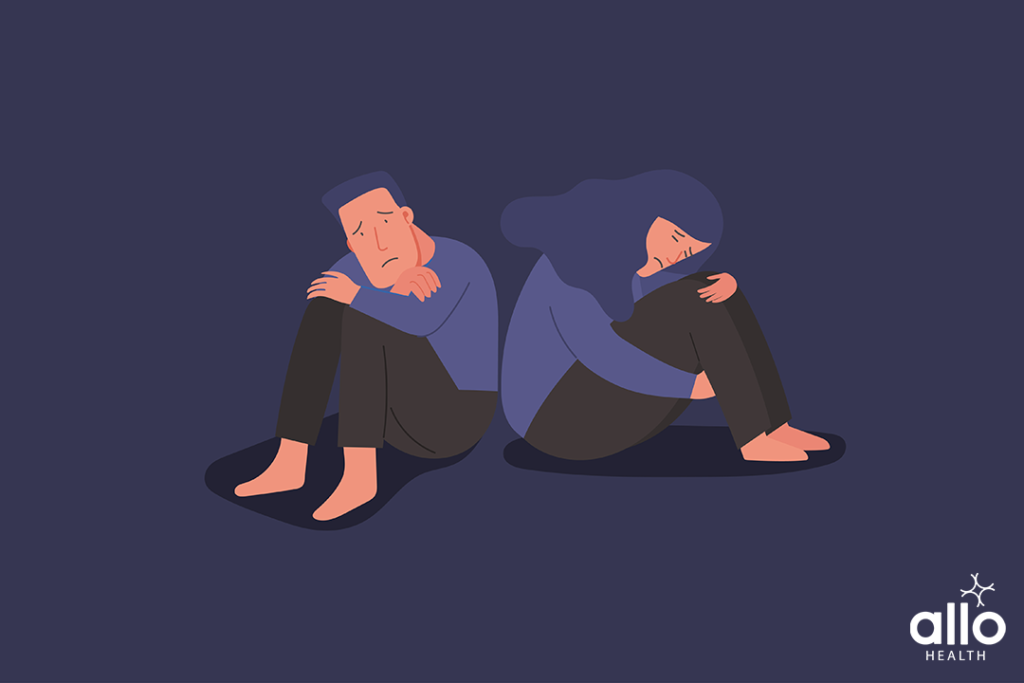Is Your Low Sex Drive Normal?

Allo Health is dedicated to personalized well-being, offering support and trusted information tailored to individual health goals. The platform emphasizes human-generated content, led by a distinguished medical team of experts, including physicians and sexual health specialists. Their commitment to credibility involves rigorous fact-checking, authoritative research, and continuous updates to ensure accurate, up-to-date information. Allo Health's unique approach goes beyond conventional platforms, providing expert-led insights and a continuous commitment to excellence, with user feedback playing a crucial role in shaping the platform's authoritative voice.

Satadeepa is a Psychologist with 5 years of experience in the field of mental health and holds a Master's Degree in Clinical Psychology. Her areas of work interest and specialization include anxiety & mood disroders, relationship issues, self esteem development, grief, behavioural sleep medicine and sexual wellness.
Why This Was Upated?
Our experts continually monitor the health and wellness space, and we update our articles when new information became available.
Updated on 22 April, 2024
- Article was updated as part of our commitment to diversity, equity, and inclusion.

"The following blog article provides general information and insights on various topics. However, it is important to note that the information presented is not intended as professional advice in any specific field or area. The content of this blog is for general educational and informational purposes only.
Book consultation
The content should not be interpreted as endorsement, recommendation, or guarantee of any product, service, or information mentioned. Readers are solely responsible for the decisions and actions they take based on the information provided in this blog. It is essential to exercise individual judgment, critical thinking, and personal responsibility when applying or implementing any information or suggestions discussed in the blog."
What is Low Sexual Desire?
Low sexual desire, also known as hypoactive sexual desire disorder (HSDD), is a condition in which an individual has a lack of interest in sexual activity. This can be a distressing and troubling condition for those who experience it, as well as for their partners.
There are several causes for the loss of libido. Hormonal changes, such as those that occur during menopause, can affect sexual desire. Psychological factors, such as stress and anxiety, can also play a role. Certain medications, such as antidepressants, can also cause low sexual desire.
Symptoms of low sexual desire can include a lack of interest in sexual activity, difficulty becoming aroused, and difficulty achieving orgasm. These symptoms can have a negative impact on an individual’s overall quality of life, as well as on their relationships.
Treatment for low sexual desire or loss of libido can include lifestyle changes, such as reducing stress and increasing physical activity. Hormonal therapy may also be used to address hormonal imbalances. Therapy, such as cognitive behavioral therapy, can also be helpful in addressing psychological causes of low sexual desire.
Low sexual desire is a common condition, and there is no need to be ashamed or embarrassed about seeking help. A healthcare provider (e.g., Sex therapist) can provide a proper diagnosis and recommend an appropriate treatment plan.
Is Low Sex Drive Normal?
Sexual desire can vary greatly from person to person, and what may be considered low for one person may be perfectly normal for another. However, if you feel that your lack of sexual desire is causing distress or affecting your relationships, it may be worth seeking help.
There are many potential causes of low sexual desire, including hormonal imbalances, stress, depression, and certain medications. In some cases, a medical condition or injury could be the cause.
Sexual desire can change over time and throughout different stages of life. For example, it’s not uncommon for women to experience a decline in sexual desire during menopause due to hormonal changes.
If you’re concerned about your low sexual desire, it’s a good idea to talk to your doctor or a therapist. They can help you identify the underlying cause and develop a treatment plan.
Treatment options for low sexual desire may include hormonal therapy, counseling, or lifestyle changes such as exercise and stress management. In some cases, medication may also be prescribed.
Sexual desire can be a complex concern, and there is no one-size-fits-all solution. What works for one person may not work for another. What is considered as normal sexual desire can vary greatly between cultures and societies. It is important to seek help if you feel that your low sexual desire is affecting your quality of life.
Causes Of Low Sex Drive
Medical Conditions That Cause Low Sex Drive
Some of the most common medical conditions that can lead to a reduced sex drive include:
- Hormonal imbalances: Hormone levels play a crucial role in regulating sexual desire and function. Low levels of testosterone, estrogen, and thyroid hormones can all lead to decreased libido. Hormonal imbalances can be caused by a variety of conditions, such as polycystic ovary syndrome (PCOS), menopause, hypothyroidism, etc.
-
Depression and anxiety: Mental health conditions such as depression and anxiety can take a toll on a person’s sexual desire and function. These conditions may often lead to low feelings of self, which can lead to decreased sexual interest.
- Medications: Certain medications, such as antidepressants, blood pressure medications, and birth control pills, can lead to decreased libido as a side effect. It is important to discuss any concerns about sexual side effects with your healthcare provider to determine if a change in medication is necessary.
- Chronic illnesses: Chronic illnesses such as diabetes, heart disease, and multiple sclerosis can all have a negative impact on sexual desire and function. These conditions can cause fatigue, pain, and decreased energy, which can make it difficult to engage in sexual activity.
- Substance abuse: Substance abuse, particularly alcohol and drug use, can lead to decreased libido. Alcohol and drugs can also impair sexual function and make it difficult to achieve and maintain an erection.
If you are experiencing low sex drive and suspect it may be related to a medical condition, consult with a healthcare provider to determine the underlying cause and develop an appropriate treatment plan. With the right diagnosis, treatment, and support, it is possible to regain sexual desire and improve overall sexual function.
Psychological Conditions That Cause Low Sex Drive
Some of the most common psychological conditions that can lead to low sex drive include:
- Depression is one of the most common psychological conditions that can lead to low sex drive. This is because depression can cause feelings of sadness, hopelessness, fatigue and a loss of interest in activities, including sex.
- Anxiety is another psychological condition that can lead to low sex drive. Anxiety can cause feelings of nervousness, worry, and fear, which can make it difficult to relax, get sexually aroused and enjoy sexual activity.
- Stress can also have a negative impact on sex drive. Stress can cause fatigue, making it difficult to find the energy for sexual activity. It can also lead to concerns with erectile dysfunction or difficulty achieving orgasm. Stress can take a toll on your body and mind, making it difficult to relax and enjoy sexual activity. Stress can also lead to anxiety and depression, which can further decrease your sex drive.
- PTSD (Post Traumatic Stress Disorder) can also lead to low sex drive. Traumatic events such as sexual abuse or assault can make it difficult to engage in sexual activity.
- Other psychological conditions that can lead to low sex drive include bipolar disorder, schizophrenia, and eating disorders.
Treatment for low sex drive caused by psychological conditions may include therapy, medication, or a combination of both. It’s important to find a treatment that works for you and your specific condition.
Lifestyle Factors That Cause Low Sex Drive
Some of the most common lifestyle factors that can lead to low sex drive include:
- Lack of sleep: Sleep plays an important role in overall health and well-being, including your sex drive. Not getting enough sleep can lead to fatigue, making it hard to get in the mood for sex.
- Poor diet: A diet high in processed foods and low in nutrients can negatively impact your sex drive. Eating a healthy diet that includes plenty of fruits and vegetables, lean protein, and healthy fats can help improve your sex drive.
- Lack of exercise: Regular exercise is essential for maintaining good health, including sexual health. It helps to improve circulation, build stamina, reduce stress and boost self-confidence.
- Alcohol abuse and drugs: Excessive alcohol and drug use can decrease your sex drive and make it harder to achieve and maintain an erection.
If you are experiencing low desire for sex, it is important to address some lifestyle factors that may be contributing to the concern.
Low desire for sex can be influenced by a variety of factors, including hormonal imbalance, advanced age, medication side effects, chronic illnesses, some mental health or psychological conditions and addictive or compulsive behavior. A treatment plan is only considered after a holistic evaluation is done to determine the underlying cause. Low sexual desire can co-exist with other sexual disorders, either as a symptom or a cause.
While low libido is often experienced by many, it is by no means “abnormal”—due to the many factors that can lead to it, the symptoms can be inherently subjective. If you feel that your symptoms of low sexual desire have been affecting your physical and mental health, we encourage you to reach out to a professional.
The stigma associated with sexual dysfunction or concerns related to sexual health is unnecessary. Sexual desire disorders are common and treatable. Understanding the cause behind these symptoms will help you understand that it’s perfectly normal to experience low sexual desire.







































